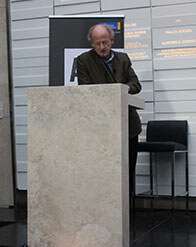It is time for Aboriginals to reclaim their power and influence in Canada.
This is what author, essayist and president of PEN International John Ralston Saul is advocating for. Host of ‘A New Conversation: Indigenous and New Canadian Perspectives on Canada’ held at Ryerson University Monday night, Saul aims to bring this message to the forefront. He has already sparked a lot of global and national attention on citizenship and the public good with his books A Fair Country: Telling Truths about Canada and The Comeback.
 “Here we are in the new Canadian city with the majority of its population unborn here, it is also the biggest reserve in Canada,” says Saul (pictured to the right). “There’s 75 to 100 thousand Aboriginals and there’s basically no conversation going on, between the people who are from here and the people who are coming here.”
“Here we are in the new Canadian city with the majority of its population unborn here, it is also the biggest reserve in Canada,” says Saul (pictured to the right). “There’s 75 to 100 thousand Aboriginals and there’s basically no conversation going on, between the people who are from here and the people who are coming here.”
With both the Native and newcomer voice present, event panellists include: Indigenous author and poet, Lee Maracle, senior advisor to the president of the University of Manitoba, Ovide Mercredi, director of zone learning at Ryerson University, Randy Boyagoda, and executive director of the Global Diversity Exchange, Ratna Omidvar.
After an opening prayer from Cree elder, Joanne Dallaire, panel members deliver individual opening statements, all underlining the main point: reissue the Canadian narrative back to its original state and find out what the original conversation surrounding Aboriginals consisted of. Furthermore, once the original conversation and narrative is brought to life, share it consistently.
Understanding History
Mercredi says the lack of knowledge on the issues that Indigenous communities face stems from people not having an understanding of Canadian history. He then alludes that the majority of Aboriginals’ history was spent protecting themselves and avoiding poverty as an essence for survival.
“The conversation between the first peoples of Canada and the newest people of Canada is a vacuum, it does not happen.” – Ratna Omidvar, Global Diversity Exchange
“Historically, the conversation between [Aboriginals], French and the English, didn’t go too well, because once they got a foothold of our territory they were dismissive of our people our culture and our own sovereignty,” explains Mercredi.
“Then, began a process of displacement and a process of non-engagement. So, most of the history has been about trying to protect our history.”
In parallel to Mercredi, Maracle states that European’s colonization over Canada has been nothing, but detrimental.
“Things changed when the British lost their rights to automatic citizenship. It changed because the people coming from the other parts of the world were people of colour,” she explains. “Although, the [British] didn’t lose their place as the dominant white male.”
Dialogues Without Barriers
The panellists emphasized that the conversation around the land people come to needs to be accurately taught. Boyagoda explains that growing up in the ’70s and ’80s, the talk of native people in Canada was greatly circumvented.
“I probably lived through what I would describe as the institutionalization and professionalization of the conversation around Indigenous rights and relations with the rest of Canada,” he says. He adds the continuation of raw, in-depth conversations would be considered a “luxury good” to a lot of immigrants he knows..
But, Omidvar claims the issue is far more deeply rooted.
“The conversation between the first peoples of Canada and the newest people of Canada is a vacuum, it does not happen,” Omidvar says, passionately. “I think this is a result of the way the country has constructed itself, which encourages people to stay separate as opposed to coming together. It’s the way we have constructed our national narrative.”
“We have a short history as far as the nation states is concerned, it will be about 150 years old in 2017, when you’re celebrating these years, look around you, how many Indigenous people will be celebrating with you?” – Lee Maracle, University of Manitoba
Maracle adds her narrative began with her not being a citizen at all.
“I am not a Canadian, because to say that I would have to say I colonized myself and I was happy doing it. I was under immigration until I was 12 years old and then one day they said you’re a citizen… of what?” she asks. “Who said [Aboriginals] wanted to be [‘Canadian’]. Nobody asked us.”
Making note of Maracle’s maltreatment, Mercredi encourages audience members to think about where their pride for the Canada they know comes from.
“We have a short history as far as the nation states is concerned, it will be about 150 years old in 2017, when you’re celebrating these years, look around you, how many Indigenous people will be celebrating with you?” he asks. “If poverty remains the result of Canada becoming a nation’s state and the only opportunity we have on our traditional homelands there really isn’t much to celebrate. We have to envision a better country.”
Developing a Better Country
The panellists all put forth various ideas for how to move the Canadian narrative forward. Ratna says developing a better country involves all provinces working together, as some are progressing faster than others. According to Saul provinces like British Columbia, Quebec, Saskatchewan and Manitoba are ahead in the discussion, but the Maritimes and Ontario fall short.
“Stop using the languages that have been forced upon us by universities, because they teach European [education].” – John Ralston Saul
Mercredi says that political parties should not dominate the conversations surrounding Indigenous and newcomers – a sentiment the audience applauds.
Saul says the first step in generating a new conversation is changing linguistics.
“Stop using the languages that have been forced upon us by universities, because they teach European [education],” he says. “All of the terminology like ‘nation state’ and ‘sovereignty’ come out of Eurocentric societies and are designed to create monolithic states. This is the fundamental contradiction in the conversation.”
Perhaps most poignant is elder Dallaire, who as she closes the event in prayer, encourages a simple way to start: take the conversation outside academic settings.
“When you meet up with your friends for a drinks bring this discussion to them, and let the conversation spread.”





